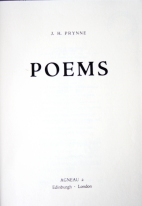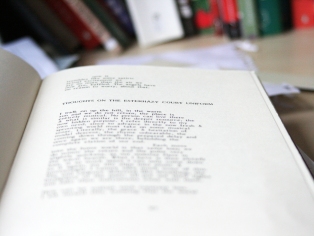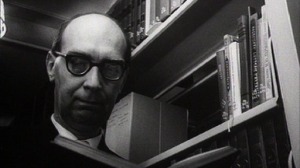Having sauntered down to the library to pick up a copy of Prynne’s Poems, I hopped onto the bus and headed home. En route, I thought I’d dabble in a sneak preview of the week’s reading and pulled the hard-bound book from my bag. I can’t remember which poem I read first, but I can recall my immediate response; face scrunched up, eyes blinking repeatedly in confusion, I glanced from page to window and back again, making sure that what I had just read was written in the English language. Because normally, when you read things in your mother tongue as you are doing right now, your brain somehow assimilates the black forms on the page into a nice, neat, meaningful bubble of information and might stimulate your stream-of-consciousness. From the off, you know that Prynne’s poetry is operating on another level, a level you do not (yet, perhaps) have the key to. It is notoriously difficult, although perhaps ‘difficult’ is a bit soft – at times, it seems nigh impossible, an impenetrable jumble of diction thrown together for some confused purpose. I remember feeling frustrated and incapable of accessing this poetry. A final year English undergraduate who couldn’t make head nor tail of a poem. This can’t be happening, I despaired. What have I been doing for the past three years? After one last glare at the text (I saw the words, I knew what they meant, most of them, on their own, but as a sentence – what on earth!) I flipped the cover, slid it into my bag and sat silent in a sordid pool of nervous anticipation for when I got home and had to study the damned thing.
Yet what I found is that Prynne’s poetry, although certainly esoteric, is an exciting challenge which bears fruit when getting your teeth into. But how do you get your teeth into such a mesmerising maze of obscure allusions, extraordinary Will Self-like diction and a wide range of experimental forms. Here are a few pointers and thoughts for anyone compelled to explore the poetry of Mr Prynne:
- Always have the OED and Wikipedia at your disposal. Even if you feel familiar and comfortable with a word, look it up and check out the various meanings Prynne may be juggling with. As a poet, Prynne is fascinated by language and the possibilities it offers. However, following post-structuralist analysis of philosophers such as Jacques Derrida, there developed a notion of discomfort and instability surrounding language which Prynne meddles with in his poems. Derrida says that language is intangible, with meaning always slipping away from us and impossible to pin down. So if you don’t understand a word and go to the dictionary to find out what it means, this meaning is conveyed to us through a load more words which, in turn, you don’t understand properly anyway! In this way, you may feel comfortable with the words in Prynne’s poetry, but the words are supposed to lull you into the false sense of security that language gives and Prynne makes you aware that the tool you use to create meaning (language) is much more complicated that you might have thought. Also Wikipedia is useful for giving relatively brief explanations of more technical terms and theories which you will encounter in the poems.
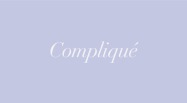
- If you become frustrated and exhausted because of the poetry, take a break and don’t worry too much about it. Bear in mind that Prynne wrote this poetry with a particular audience in mind; a highly intellectual one, aware of post-structuralist linguistic theory and interested in bio-chemic subjects, plus many others. Prynne is aware of the decline in the readership of poetry in the 20th century, which (unfortunately) continues up until today, and instead of trying to lure in and attract a wider audience, Prynne opts to pitch his poetry to the academic audience of contemporary poetry. Thus the poetry is somewhat elitist, and is almost a high culture puzzle or experiment which exists to challenge fellow academics. For this reason the poetry is sometimes intolerably difficult, but what I found is that the amount of effort and thinking required by Prynne’s poetry pays dividends elsewhere and will make you a more active reader in general.
- Don’t, as we so often do, disregard or skim over the poems’ titles. Perhaps even read the poem first, try to decipher some themes, ideas, discourses, and then read the title in relation to the content of poem. Often, as in ‘Thoughts on the Esterhazy Court Uniform’ (See below), the title seems to bear no relation to the poem itself. Strange. Why? Prynne appears sceptical of accepted poetic form and formalities and continually questions these traditions. Why do we give poems titles? What purpose do they serve? Are they useful? What happens if we give the poem a nonsense title? These are the sorts of questions that fuel Prynne’s work. Also question other elements of poetic formality; how is the enjambment working? Does it look like a poem? If so why? Or if not, why not? Why does he choose this or that form?
- Do not think that this poetry is above and beyond you. Although arguably being an ‘elitist’ brand of poetry, Prynne himself (I think) would not claim that his poetry is beyond anybody. To me, his poetry subscribes to Roland Barthes’ theory of the death of the author. In short, Barthes’ claims that a book is a ‘fabric’ woven from the different strands of the writer’s life at the point when the pen touches the page; the historical/social/economic context in which it is written, the purpose for which the book is being written, the processes it goes through after being written (editorial changes), etc. With so much going on, the author becomes a negligible feature in relation to the text itself and is solely the human being who put the pen to paper at that time. Thus the text is exalted and the author dies. The importance then turns to the reader, because without him/her the text carries no meaning whatsoever. And so meaning can only be created using the imagination of the reader and that meaning, no matter what it is, becomes the foremost important element at that point. This is suggested by the presentation of some of Prynne’s texts, for example. Brass (1971) and many of his other titles do not contain the authors name on the exterior of the book, which is often of a simple design, and so the importance of the author is played down. What is important is the title, the poems themselves, and what they evoke in the reader.
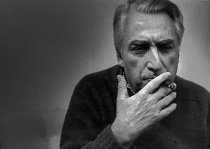
- Read poems in sequence and note down themes which are constructed and dealt with through several poems. Many poems deal with similar ideas or themes which are sometimes referred to briefly and might need to be read alongside sections of other poems to create a fuller idea of Prynne’s discussion. A couple of themes I have noticed are; ideas around water/frost/ice, the processes between different states and the importance of this chemical in natural history; religion, its role in society, and philosophical ideas surrounding the concept of a ‘God’; the notion of return, going back to something in the past, appears to be a recurring idea and this also relates to ideas surrounding the concept of nostalgia (why do we yearn for the impossibility of the past), the passage of time, the process of aging, and the importance of sequences and development through time.
I hope some of these thoughts might help any novice readers of Prynne or tempt you to give him a go. Despite the complexity and challenges of his work, he is a writer whose work bears fruit to the reader who tackles the obstacles with the right tools. He is a writer who, although I cannot claim to fully understand the concerns of his poetry, has changed the way that I approach the experience of reading poetry (and literature in general) which for many of us remains such a passive one, although we assume otherwise. If you want to have a dabble, here is a poem published in his Poems (1982):
THOUGHTS ON THE ESTERHÁZY COURT UNIFORM
I walk on up the hill, in the warm
sun and we do not return, the place is
entirely musical. No person can live there
& what is similar is the deeper resource, the
now hidden purpose. I refer directly to my
own need, since to advance in the now fresh &
sprouting world must take on some musical
sense. Literally, the grace & hesitation of
modal descent, the rhyme unbearable, the
coming down through the prepared delay and
once again we are there, beholding the
complete elation of our end.
Each move
into the home world is that same loss; we
do mimic the return and the pulse very
slightly quickens, as our motives flare in
the warm hearth. What I have is then already
lost, is so much there I can only come down
to it again, my life slips into music &
increasingly I cannot take much more of this.
The end cadence deferred like breathing, the
birthplace of the poet: all put out their lights
and take their instruments away with them.
How can we sustain such constant loss.
I ask myself this, knowing that the world
is my pretext for this return through it, and
that we go more slowly as we come back
more often to the feeling that rejoins the whole.
Soon one would like in a sovereign point and
still we don’t return, not really, we look back
and our motives have more courage in
structure than in what we take them to be.
The sun makes it easier & worse, like the
music late in the evening, but should it start
to rain—the world converges on the idea
of return. To our unspeakable loss; we make
sacred what we cannot see without coming
back to where we were.
Again is the sacred
word, the profane sequence suddenly graced, by
coming back. More & more as we go deeper
I realise this aspect of hope, in the sense of
the future cashed in, the letter returned to sender.
How can I straighten the sure fact that
we do not do it, as we regret, trust, look
forward to, etc? Since each time what
we have is increasingly the recall, not
the subject to which we come. Our chief
loss is ourselves; that’s where I am, the
sacral link in the pantheon of hallowed times.
Our music the past tense:
If it would only
level out into some complete migration of
sound. I could then leave unnoticed, bring nothing
with me, allow the world free of its displace-
ment. Then I myself would be the
complete stranger, not watching jealousy
over names. And yet home is easily our
idea of it, the music of decent and proper
order, it’s this we must leave in some quite
specific place if we are not to carry it
everywhere with us.
I know I will go back
down & that it will not be the same though
I shall be sure it is so. And I shall be even
deeper by rhyme and cadence, more held
to what isn’t mine. Music is truly the
sound of our time, since it is how we most
deeply recognise the home we may not
have: the loss is trust and you could
reverse that without change.
With such
patience maybe we can listen to the rain
without always thinking about rain, we
trifle with rhyme and again is the
sound of immortality. We think we have
it & we must, for the sacred resides in this;
once more falling into the hour of my birth, going
down the hill and then in at the back door.
Thanks for reading!

